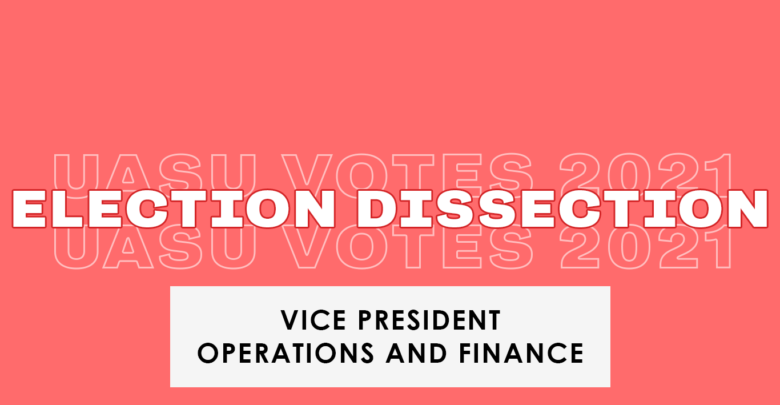SU Elections Dissection 2021: Vice-President (Operations and Finance)
The panel felt one candidate's plan to monetize the SU set them apart from the other
 Pia Co
Pia CoEvery year The Gateway hosts a panel to determine who should and who will win in each race for the Students’ Union elections to assist those undecided on who to vote for. Our election dissection panel is here with their insights on student politics and their takes on this year’s candidates.
Opinions expressed by the panellists do not reflect those of The Gateway.
The panel
This years panel for election dissection included:
- Ashlynn Chand: U of A alumni, former arts and culture editor at The Gateway
- Stephen Raitz: U of A alumni, past candidate for Students’ Union vice-president (student life)
- Kelsey Fortier: second-year law student
Candidates
Emily Kimani, a fourth-year immunology and infection student and a current science councillor for the Students’ Council.

Julia Villoso, a second-year psychology student and current arts councillor for the Students’ Council.

Right off the bat, Fortier said that she feels like Villoso is the stronger candidate.
“I have a lot respect for her — I have concerns about the pragmatics of some of her plans, but what I really think is important is that she recognizes that things are fundamentally different and is actually putting forward ideas on how to cope.”
She specifically highlighted Villoso’s IT plans, such as monetizing SU TV, and external fundraising as stand out platform points. She also gave praise for Villoso’s social media campaign, pointing out Villoso’s acronym AIM, which stands for accessibility, inclusivity, and maximization of operational capacity.
Frontier sees Kimani as more of the status quo candidate, and worried about her plans to rely on the Myer Horowitz theatre for external revenue.
“She seems to be banking on the theatre but there is so much uncertainty there,” she said. “There’s so much speculation in terms of vaccination rates — theatre events are going to be the last thing to open and I question if that is a good idea.”
For Chand, the two candidates leaver her with a similar impression. However, similar to Frontier, she still sees Villoso standing out more in certain ways.
“I do think the candidates are very similar on the surface,” she said. “I don’t really feel very strongly for one or the other, but I do find that Villoso has [platform points] that are more strategic and you could do.”
Chand also went on to mention that Kimani’s plans for the theatre are also questionable and wants her to think more about the longevity of Students’ Union businesses and the jobs they employ during COVID-19.
“There’s a strong chance we won’t have events for another two years and I think this is what you should be thinking of when you’re thinking of operations and finances — the worst-case scenario.”
Chand also pointed out that both candidates focus on inclusivity a lot, which is something she sees as more of a vice-president (student life) idea, leading her to question if the candidates truly know their portfolios.
Raitz agreed with Chand that both candidates don’t necessarily stand out to him and also agreed may not know their portfolios as throughly as other candidates.
“I was not super hot on either of these candidates — I don’t think they are weak or bad candidates in anyway, but it seemed like there was not a full understanding of the portfolio and there was not a lot of big ideas presented… I think they are both good candidates, but I’m not overwhelmed with what they are putting forward.”
Something Raitz would’ve liked to see more from both candidates is how they are going to adapt Students’ Union services to the uncertainty of the pandemic.
“How are you going to make SU businesses work when there are people who may be comfortable on campus and people who won’t feel comfortable on campus?”
Though both candidates have monetizing SUTV in their platform, this is a point that Villoso has returned to almost every forum. When asked about Villoso’s plan to monetize SUTV, Fortier said despite missing details on how she would implement it, she likes that if COVID-19 pandemic continues, this is a plan that is possible.
In terms of sustainability, Kimani details making SUB vendors use more sustainable materials for packaging, as well as creating a bulk foods section in SUBmart, something current vice-president (operations and finance) Alana Krahn campaigned on.
For Raitz, the fact that Krahn couldn’t get it implemented this year highlights that there is likely opposition from internal Students’ Union administration to this idea. Chand also pointed out that if the pandemic continues, implementing a bulk foods program would likely not happen again.
In the end, all three panellists would pick Villoso over Kimani. However, Chand and Fortier both believe that Kimiani will win due to popularity.
“I think Kimani might win because I feel she is more popular, though I can’t prove that,” Chand said. “It’s my gut feeling.”
“I think Emily is more likely to win and the reason being I think there is a complicit favouritism towards people who are in higher years of university and it’s gonna matter more this election because the longer you’ve been here the more connections you’re gonna have and it’s gonna be a connections race because of people not being on campus.”
Raitz however, is keeping his money on Villoso.
“I feel like Villoso is running a better ground game and there is more content that is accessible,” he said. “I think she will win for that and I think she should win.”
Who should win: three votes for Julia Villoso
Who will win: two votes for Emily Kimani, one vote for Julia Villoso




